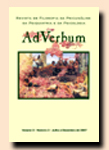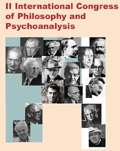|
 |

| BOOKS |
These are some of the more recent publications in the area of philosophy of psychoanalysis in Brazil, with a brief comment on their themes and contents.
By clicking on the picture a new window pops up. There you can have a closer view of both cover and summary of the book.
If you want to send another comment on anyone of the books, or suggest another book to figure in our site, just get in contact by clicking -----> HERE <------.
We do not sell books (or anything). To buy anyone of them you can go to a Brazilian virtual bookstore like Livraria Cultura, Submarino, Fnac or Imago.
 Click on the Picture Click on the Picture
Freud in the Brazilian Philosophy
Orgs: Leopoldo Fulgencio &
Richard Theissen
Simanke
Editora Escuta, 2005.
Articles from Bento Prado Jr.,
Ernildo Stein, Luiz Roberto Monzani, Osmyr Faria Gabbi Jr., and Zeljko
Loparic on Freud and/or psychoanalytic theory in general. These articles typify the research lines of the thinkers that begun the discussions on philosophy of psychoanalysis in Brazil.
 Click on the Picture Click on the Picture
Notes on the Project for a Scientific Psychology
Author: Osmyr Faria Gabbi
Jr.
Editora Imago, 2003.
Notes followed by a Portuguese translation of the seminal and unpublished Freud's manuscript from 1895. This book deals with the philosophical sources of the future metapsychology to be presented in the Interpretation of Dreams. Its a careful research which intends to demonstrate how the freudian theory is subsidiary, in its origins, to John Stuart Mill's empirical psychology. The book elucidates, among other things, the relationship between the economic aspect of the psychic processes and the proposal of a word based analysis, why the essence of the psychoanalytic method consists in giving words to the afects, besides some reflections on Freudian language theory and the mechanism responsible for symbols productions in defense neuroses.
 Click on the Picture Click on the Picture
Natureza Humana
Journal of Philosophy and Psychoterapeutic Practices
This Journal publishes specialized texts on the foundation of psychoterapeutic and, in particular, psychoanalytic theories and practices. Martin Heidegger and Donald W. Winnicott's writings are taken as the main, yet by no means exclusive, reference points.
The choice of Heidegger and Winnicott does not mean that they are trying to establish a new orthodoxy or, much less, a new sect. Far from that, the intention is to favour the emergence of a new research tradition which can dedicate themselves to solve still open philosophical as well as scientific questions.
 Click on the Picture Click on the Picture
Fundamentals of Psychoanalysis
Thought, Language, Reality and Anxiety
Organized by: Osmyr Faria Gabbi Jr.
Editora Unicamp -
Coleção CLE, 1999.
Collection of four essays which bring to their readers a small sample of a kind of approaching the Freudian work, developed in a certain period in the University of Sao Paulo and the University of Campinas in graduation programs of philosophy. The authors are: Osmyr Faria Gabbi Jr., Cláudio E. M. Banzato, Pedro L. R. de Santi, and Alessandra Caneppele.
 Click on the Picture Click on the Picture
D. W. Winnicott Growth Theory
Author: Elsa Oliveira Dias.
Editora Imago,
2003.
Although Winnicott had always insisted in the central character of the growth theory, he never made a systematic or organized presentation of it. The only book which has a clearer description of the global process of growth is Human Nature (1988), which remained unfinished. For this and other reasons, the aprehension of the unity of his thought became difficult. The objective of this book is to describe, in a clear and unitary way, the main conceptual elements of Winnicott's growth theory, explaining its presuppositions and showing
the processes steps, with its respective tasks and conquests.
|
 Click on the Picture Click on the Picture
Lacanian Metapsychology
Author: Richard Theissen
Simanke
Discurso Editorial, 2002.
Its a large and diligent work dedicated to the formation years (1932-1953) which organized the Lacanian psychoanalytic scenario in France. The author iluminates the driving forces which perpetuate themselves in the program that reformulated psychoanalysis in a very distant style from the Freudian perspective, but, in spite of that, which became acquainted as its more orthodox reinterpretation.
 Click on the Picture Click on the Picture
A Tense Limit: Lacan Between Philosophy and Psychoanalysis
Organizer: Vladimir Safatle
Editora Unesp, 2003
Twelve articles and twelve perspectives on twelve different intersections between Lacanian psychoanalytical theory and philosophy, the great achievement of this book is to provide a snapshot of the huge possibilities on variations around a given theme.
Alain Badiou, Paulo Eduardo Arantes, Peter Dews, Ruy Fausto, Monique David-Ménard, Slavoj Zizek, Vladimir Safatle, Bento Prado Júnior, Antonia Soulez, Richard Simanke, Célio Garcia and Jean-Pierre Marcos, form the French-Brazil team of experts who give their opinions, not without a passionate style and parti-pris in some cases, about connections and inner relationships between Lacanism and philosophy.
 Click on the Picture Click on the Picture
The Law of Desire
Epistemology of the Lacanian Psychoanalysis
Author: Luiz Carlos Santuário
Editora da Universidade de
Caxias do Sul, 2004
It is a careful philosophical study around the linguistic repertoire of the Lacanian theory which aims at a critical evaluation of the epistemological results of his peculiar conceptual scaffolding.
The Lacanian project is examined not only from the viewpoint of its genesis but also under the aspect of its theoretical construction. Both its philosophical and non-philosophical bases are described. The author's challenge was to demonstrate the organizing model of the Lacanian theoretical apparatus.
|
|
|
 |
 |

Philosophy of Psychoanalysis, Philosophy of Psychiatry, Philosophy of Psychology.
(Abstracts in English).

University of São Carlos,
(State of São Paulo, Brazil)
24 to 28 September, 2007.
|
|
|
|


